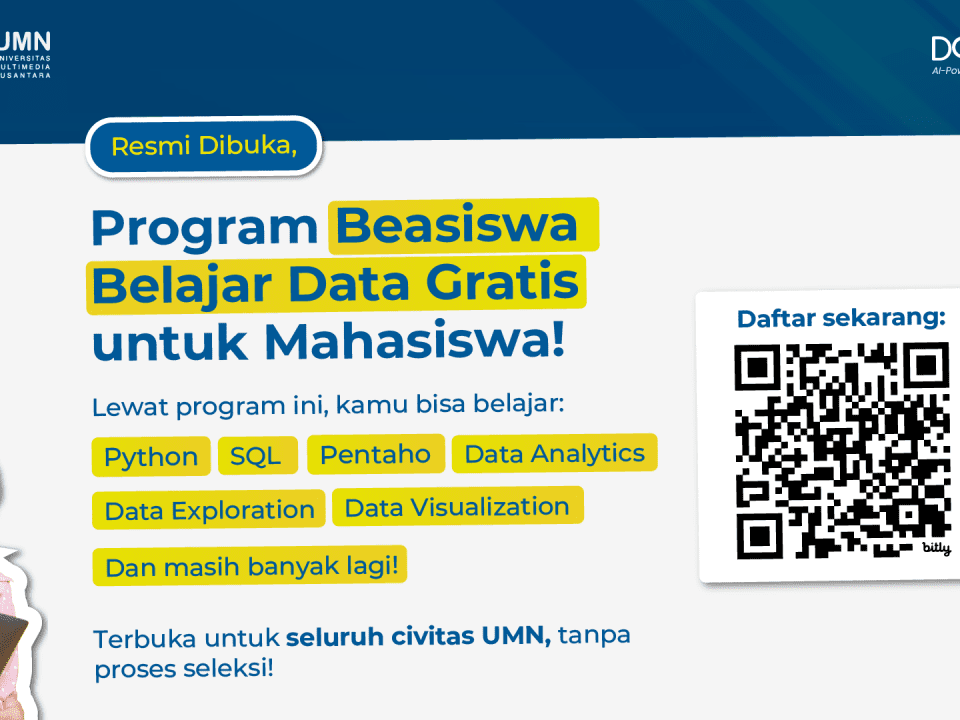
6 Job Prospects of Electrical Engineering
June 2, 2022
5 Career Prospects of Management
June 7, 2022
Human resources with capabilities in the field of technology and information are definitely highly sought after. (source: pexels)
Information System and The Career Prospect. Advances in technology have now begun to drive significant changes to many lifelines. That way, human resources with capabilities in technology and information are highly sought after. Information systems are one of the skills sought after by many companies. Why? Because this field of knowledge studies the creation and operation of data-related hardware and software. For those of you who are interested in choosing an information system major as an option, reading 101 Information System to the end can be your first gateway. Let’s check it out!
Read: Information System UMN
What is an Information Systems?
Information Systems is a scientific field that combines computer science with economics and business administration. This major will teach you how to identify company business needs and processes based on company data and design systems that meet company needs. Information systems students will also learn how to analyze, process, and visualize a company’s data to be used as a consideration by business management in making decisions in a company.
Therefore, graduates of the information systems program are expected to be able to develop data processing systems from various sources that are presented as helpful information for companies.
Read: Mahasiswa Sistem Informasi UMN Gabung Apple Developer Academy
Differences in Information Systems and Informatics Engineering
Information systems majors are often juxtaposed with informatics engineering. Many are often confused or do not know the difference between the two. Before choosing this major, it’s good to see the difference between information systems and information technology. It is so that you don’t feel wrong in determining in the end because these two majors are similar but not the same. As reported on the kompas.com page, here are the primary differences between information systems and information technology:
|
Information System |
Informatics Engineering |
| Skills: Focus on designing, developing, and implementing organizational information systems. | Skills: Focus on designing and developing a variety of computational algorithms. |
| Curriculum: Learn how the technology and information systems owned are aligned with the company’s business strategy to create a competitive advantage in the market. | Curriculum: science related to mathematical logic, computing, and algorithms whose applications are associated with the development of computer programs. |
| Scope of Knowledge: Integration of information technology solutions with business processes to meet the organization’s information needs. | Scope of Knowledge: The spectrum is theoretical and algorithmic to apply, such as developing robotics and intelligent systems. |
| Scope of field: The foundational science of business, covering business administration, management principles, information systems, accounting, and financial information systems, enterprise systems, architecture, and enterprise application programming. | Scope of fields: Computational science includes programming, algorithm design, analysis, computer architecture, operating systems, computer networks, computational theory, intelligent systems, software engineering, numerical analysis, etc. |
| Study program objectives: Intended for graduates with skills related to the development, utilization, and management of Information Systems/Information Technology in an organization | Study program objectives: Intended for graduates with skills related to the field of Information Technology through the use of Computer Science, including the design of algorithms and their implementation to develop quality software to update applications based on artificial intelligence, robotics, multimedia information processing, information security and networks, and big data processing. |
Why should you choose an Information Systems?
In 2019, LinkedIn launched the 15 most promising jobs, one of which is related to technology. Information Systems is one of the majors pursued by many students and companies later. So that you are more confident in choosing this primary, here are some reasons you can consider:
1. Simpler than Informatics Engineering
Judging from the weight of the curriculum and courses, majoring in information systems is indeed simpler than computer engineering. In the computer engineering major, you have to learn all the details about computers, even coding, but it will not be that deep in the information systems major. The curriculum also incorporates business and management.
2. Studying Two Sides
As you have seen in the previous discussion, information systems do not only study computing but also study management science because this information system combines the management department and the computer engineering department. Cool, right?
3. Start your career in college.
Because information systems work with computers, you can also become a programmer. And being a programmer doesn’t have to wait until you graduate from college. You can start while studying, and it can be used as additional pocket money, right?
4. Most Wanted By Companies
It has been mentioned from the start that industry 4.0 makes everything computerized. That’s why companies are hunting many graduates from information systems majors.
What will you learn in Information Systems?
It’s simpler than Informatics Engineering, so what exactly does a student majoring in information systems learn?
Because an Information Systems graduate is expected to apply his knowledge to the needs of a company or organisation, the course material obtained is a combination of management, business, and information technology skills. As a result, this knowledge is used to answer the needs of corporate application programming, business administration, accounting, and financial information systems.
Courses majoring in Information Systems include the following:
- Enterprise Resource Planning
- Information Technology Project Management
- Information Technology Procurement and Investment Management
- Information Technology Risk Management
- Information Asset Security
- Software Analysis and Design
- Computer Network Design and Management
- Business Process Design and Management
- Programming language
- Information Systems and Technology
Multimedia Nusantara University is one of the universities with the best information systems majors. The UMN Information Systems study program has several specializations that students can choose to study more deeply. The focus of the UMN Information System is Mahadata, so several fields that support this include Big Data Specialist, IT Governance Specialist, Enterprise Resource Planning Specialist, and Database specialist.
Of course, this will prepare students to face future technological and industrial developments. In addition, UMN Information System students will have the opportunity to get two international certifications, namely the Data Visualization certificate and the Data Modelling certificate, which will be very useful for students in the world of work later. That’s cool!
5 Career Prospects of Information Systems Graduates and Estimated Salaries
It is a commonplace when choosing a college major, and we must also think about career prospects. The broader the career possibilities, the more people will choose the major.
No need to worry, the major with another name in Information Management has vast job opportunities. The career paths offered are also diverse and promising. So, the knowledge and skills you get in college will be a valuable asset in the labor market. Companies will need Information Systems graduates to develop systems that bridge programmers with users.
What are the job prospects for the Information Systems major? You need to know in advance that jobs in information systems are classified as the highest paying jobs and most needed for the next ten years.
1. IT Consultant
Today’s all-digital life makes everyone inevitably have to adapt. Small and large companies have begun to adapt to information technology to create policies and formulate strategies.
However, not all parties are information technology literate. It is where the primary function of information systems graduates. You can be a bridge for those who don’t fully understand technology. These skills are needed to provide understanding, perform analysis, and others. It is where an IT consultant is required. Now many companies offer their own IT consulting services. They usually work to bridge between the technical team and staff. The average salary in Indonesia is IDR 6.9 million per month.
2. Software Developer (Software Developer)
By learning about computing and its application in real life, an information systems graduate has the potential to become a software developer who designs software according to the needs of specific companies. This work includes creating, developing, and testing computer software programs. This software will later help smooth business in various fields. Apart from that, the software also helps increase the company’s productivity promptly. Numerous industries need software developers, ranging from retail companies, the health sector, the tourism and entertainment industry, financial services, and the media. The average salary in Indonesia is IDR 10 million per month.
3. Want to be an ASN? It’s possible!
Again, this is a popular major because it is in line with the development of the digital era. All government lines have also started to go digital, although not yet on a large scale. The ministry that needs a lot of experts in the field of information systems is, of course, Kominfo. Moreover, many big cities are now starting to plan smart cities. For other government positions, information systems graduates usually occupy computer administration positions. The average salary in Indonesia: IDR 3-5 million per month (estimate for lowest class)
4. Data Scientist and Data Analyst
A data analyst will struggle with coding languages and procedures to analyze and apply data for a company decision. While the Data Scientist is responsible for processing raw data into helpful information for the business. Information systems graduates can have these two abilities at once to benefit you when choosing a career for the future. The average salary in Indonesia: IDR 7 million per month (lowest salary estimate)
5. Create your Tech Startup!
In the last five years, tech startups have sprung up more and more. You are starting from being an IT consultant for companies to startups specializing in software development. In addition to the possibility of having your own company, you can also create jobs for other people. The average salary in Indonesia: IDR – (different for each type of business)
Well, that explanation of the Information Systems major and its promising career prospects. You need to strengthen your drawing skills for those who want to be part of the Visual Communication Design students.
In the 4.0 era, the Information Systems major is in great demand and much sought after by companies. It’s a dog-eat-dog competition!
You can learn more about Information Systems at Multimedia Nusantara University through the UMN official website. You can choose the online registration procedure according to your preferences. Come on, register now and start your career with UMN!
Sources:
- UMN official website
- glints.com
- akupintar.id





